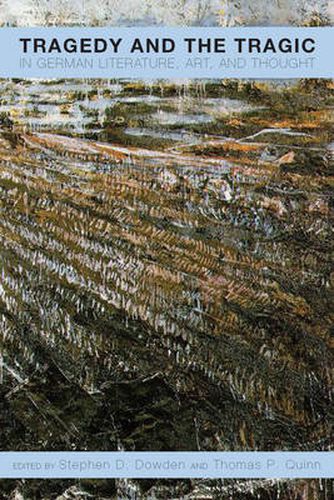Readings Newsletter
Become a Readings Member to make your shopping experience even easier.
Sign in or sign up for free!
You’re not far away from qualifying for FREE standard shipping within Australia
You’ve qualified for FREE standard shipping within Australia
The cart is loading…






The many catastrophes of German history have often been described as tragic. Consequently, German literature, music, philosophy, painting, and even architecture are rich in tragic connotations. Yet exactly what tragedy and thetragic may mean requires clarification. The poet creates a certain artful shape and trajectory for raw experience by putting it into words ; but does putting such experience into words (or paintings or music or any other form) betray suffering by turning it into mere art? Or is it art that first turns mere suffering into tragic experience by revealing and clarifying its deepest dimension? What are we talking about, exactly, when we talk about tragic experience and tragic art, especially in an age in which, according to Hannah Arendt, evil has become banal? Does banality muffle or even annul the tragic? Does tragedy take suffering and transform it into beauty, as Schiller thought?Is it in the interest of truth for suffering to be beautiful ? Is it possible that poetry, music, and art are important because they in fact create the meaning of suffering? Or is suffering only suffering and not accessible to meaning, tragic or otherwise? This book comprises essays that seek to clarify the meaning of tragedy and the tragic in its many German contexts, art forms, and disciplines, from literature and philosophy to music, painting, and history.
Contributors: Jeffrey A. Bernstein, Stephen D. Dowden, Wolfram Ette, Jennifer Anna Gosetti-Ferencei, Barbara Hahn, Karsten Harries, Felicitas Hoppe, Joseph P. Lawrence, James McFarland, Karen Painter, Bruno Pieger, Robert Pirro, Thomas P. Quinn, Mark W. Roche, Helmut Walser Smith.
Stephen D. Dowden is Professor of German language and literature at Brandeis University. Thomas P. Quinn is an independent scholar.
$9.00 standard shipping within Australia
FREE standard shipping within Australia for orders over $100.00
Express & International shipping calculated at checkout
Stock availability can be subject to change without notice. We recommend calling the shop or contacting our online team to check availability of low stock items. Please see our Shopping Online page for more details.
The many catastrophes of German history have often been described as tragic. Consequently, German literature, music, philosophy, painting, and even architecture are rich in tragic connotations. Yet exactly what tragedy and thetragic may mean requires clarification. The poet creates a certain artful shape and trajectory for raw experience by putting it into words ; but does putting such experience into words (or paintings or music or any other form) betray suffering by turning it into mere art? Or is it art that first turns mere suffering into tragic experience by revealing and clarifying its deepest dimension? What are we talking about, exactly, when we talk about tragic experience and tragic art, especially in an age in which, according to Hannah Arendt, evil has become banal? Does banality muffle or even annul the tragic? Does tragedy take suffering and transform it into beauty, as Schiller thought?Is it in the interest of truth for suffering to be beautiful ? Is it possible that poetry, music, and art are important because they in fact create the meaning of suffering? Or is suffering only suffering and not accessible to meaning, tragic or otherwise? This book comprises essays that seek to clarify the meaning of tragedy and the tragic in its many German contexts, art forms, and disciplines, from literature and philosophy to music, painting, and history.
Contributors: Jeffrey A. Bernstein, Stephen D. Dowden, Wolfram Ette, Jennifer Anna Gosetti-Ferencei, Barbara Hahn, Karsten Harries, Felicitas Hoppe, Joseph P. Lawrence, James McFarland, Karen Painter, Bruno Pieger, Robert Pirro, Thomas P. Quinn, Mark W. Roche, Helmut Walser Smith.
Stephen D. Dowden is Professor of German language and literature at Brandeis University. Thomas P. Quinn is an independent scholar.